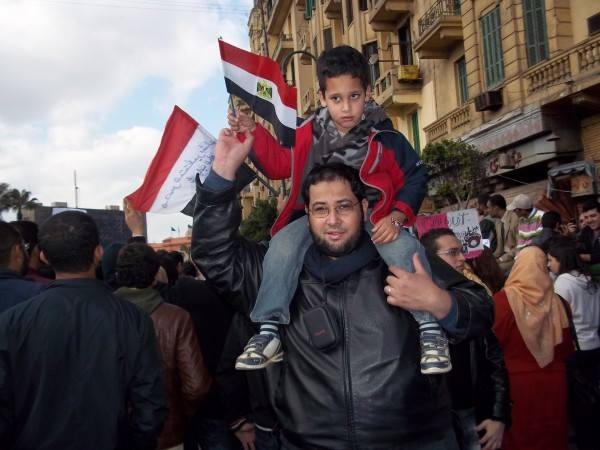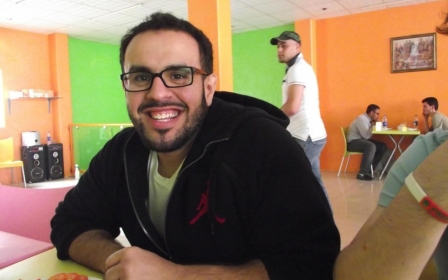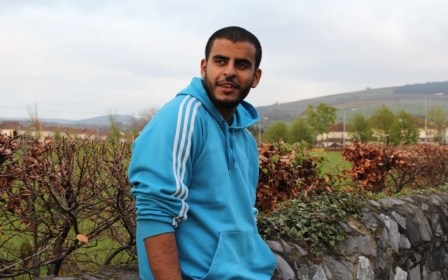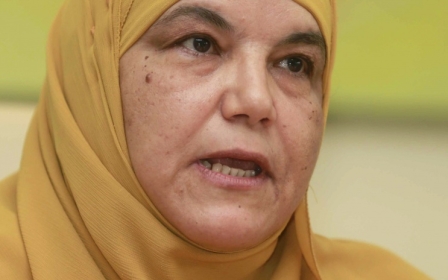Anniversary looms for Canadian resident detained in Egypt

On 17 June, the family of Abdullah al-Shami celebrated as the journalist for Al-Jazeera Arabic, who had been held in an Egyptian prison for over 300 days without charge, was released on health grounds.
Leaked recordings of Shami from inside the prison looking frail and haggard as a result of a hunger strike that had lasted more than four months had added weight to international calls for him to be freed.
Shami’s eventual release has raised the hopes of others who are currently imprisoned in Egypt amid the country’s political turmoil.
The case of Khaled al-Qazzaz is one example. A 34-year-old Canadian resident who was working as the foreign relations secretary for Mohamed Morsi’s elected government during his overthrow last July, Qazzaz has now been in prison in Egypt for almost 365 days.
Detained on 3 July as Morsi was arrested, Qazzaz has not been charged with a crime but is being held in the maximum security wing of one of Egypt’s most notorious prisons, Tora, in a complex known as Al Aqrab, the Scorpion.
According to a letter smuggled out of his prison cell and published in the New York Times on 27 June, Qazzaz has spent more than half of that time in “solitary confinement and under severe limitations”.
The price of loyalty
When Middle East Eye asked Khaled’s wife Sarah Attia how Qazzaz found himself in this predicament, she started the story - as many wives might - with the tale of how they first met.
In 2000, both were studying for their Masters degrees in engineering at the University of Toronto, she says. Qazzaz and Attia found they had a lot in common and were both very active on campus taking part in several human rights and social justice campaigns.
In 2004, they married and decided to move to Cairo where they opened an international school for children, working on the project for several years.
Seven years later, just as the couple were preparing to return to Canada, a tidal wave of revolutionary spirit gripped the nation. Egyptians took to the streets in their millions demanding a new start for Egypt. They called for president Hosni Mubarak to step down, ending almost 30 years of his rule, and for the birth of a new democracy.
Attia said the call resonated deeply with Qazzaz and they decided to give Egypt one more chance.
The political wing of the Muslim Brotherhood, the Freedom and Justice Party, and their political agenda for change appealed to Qazzaz and led him to join Morsi's campaign team.
When the party won the January 2012 parliamentary elections Qazzaz was appointed as foreign relations secretary. Part of his role was to give foreign policy advice to Morsi. He would attend international meetings with him, at which Morsi would sit with world leaders including US Secretary of State John Kerry and his predecessor Hilary Clinton, discussing issues like ways to broker peace in regions like Gaza, Syria and Mali. He also acted as the president’s note taker.
Attia insists that her husband has never been a member of the Muslim Brotherhood – which has now been designated as a terrorist organisation in Egypt – but he was arrested alongside other members of Morsi's former government. Since his overthrow, Morsi has been charged with planning ?terrorist attacks within ??Egypt, being connected to “foreign forces” and other crimes that he denies.
Attia has bitter memories of 3 July last year, which as well as being the day of the overthrow and his arrest was Qazzaz’s 34th birthday.
Qazzaz’s family, including his children Abdul-Rahman now 8, Amina 6, Fatima 4 and their youngest daughter, named Tahrir in honour of the revolution and who is almost 2, were all eagerly waiting for him to come home for the occasion, but he never made it.
As his family waited to hear from Qazzaz, the last text message his wife received from him said: “forgive me, I chose to stay with the president”.
Eight other presidential staff were also detained that day and taken to an undisclosed location. For the next two and a half months his family received no word as to where he was or how he was, other than an occasional phone call saying he was alive.
Eventually Attia learned that he was being held in a military facility. She was told she could apply for visitation but was instructed not to tell anyone where he was being held.
After months of getting nowhere, in November last year Sarah finally decided to do an interview with Human Rights Watch (HRW). HRW then issued a statement about Morsi’s ex-aides who had been “forcibly disappeared” and who were being held incommunicado.
A spokesperson for HRW told MEE that they have fully documented the fact that Qazzaz “was kidnapped and disappeared by the Egyptian military on 3 July, held in secret detention from July until December before he was transferred to Tora prison and the authorities essentially fabricated the narrative that he was detained in December when in fact he had disappeared and was in their custody for those first five months.”
According to Human Rights Watch, for months “the government refused to acknowledge that it was holding the former aides or to confirm their whereabouts, putting them outside the protection of the law”.
Under international law, HRW argued, this constitutes “enforced disappearance.” HRW stated that “The prolonged enforced disappearance of anyone is a crime, pure and simple” and insisted that “The Egyptian authorities should immediately free them unconditionally.”
Amnesty International (AI) has also supported this call. AI told MEE that their stance on this case is that: “Qazzaz was held in secret detention without access to the outside world in conditions that amount to enforced disappearance. He was then referred to Tora prison where he is held until now without charge or trial. The prolonged detention without charge of Khaled Al Qazzaz violates his rights enshrined in Egyptian and international law."
AI maintain that "The Egyptian authorities must release Khaled Al-Qazzaz unless he is immediately charged with a recognisably criminal offence by the ordinary (not military) Prosecution and given a fair trial before a civilian court with no recourse to the death penalty.”
The United Nations Human Rights Council has also published a report by the Working Group on arbitrary detention saying that their sources had informed them that “Dr Morsi and his advisors may be at risk of torture and ill treatment.”
What next?
Qazzaz’s lawyer Zeyad Alelaimy told MEE that for the first five months, his detention was renewed automatically by the prosecutor every 15 days. Now it is renewed by a judge every 45 days. In almost a year of confinement Qazzaz has only seen a judge three times. In all three instances, the last of which was 24 June, the judge barely spoke but just renewed his detention for yet another 45 days.
When MEE asked his lawyer what sort of defence he is mounting for his client, he said he raised that very point to the judge, asking how he could be expected to defend a client who had not been charged with a single crime, to which “the judge just laughed and renewed his sentence yet again.”
Qazzaz is a Canadian permanent resident but not a citizen. As such he is not entitled to consular assistance. Nevertheless, Attia and other human-rights advocates continue to push for the Canadian government to offer him more support.
HRW told MEE that in the last year they have been communicating with the Canadian officials and are continuing to “encourage them to use their public and private advocacy channels to ensure that all detainees, particularly those that are Canadian, or are affiliated with Canada, receive due process protection and rights they are entitled to under international laws.”
Emotional rollercoaster
As for prospects of release, while Attia’s hopes rose after the release of Shami, the news of the sentencing of other Al-Jazeera journalists on 23 June – including Canadian-Egyptian Mohamed Fahmy – left her “extremely disappointed”.
Attia left Egypt to take her children back to Canada two and a half months ago and has had no direct contact with her husband since. However, she says she will continue to fight for his freedom no matter where she is.
The Canadian Embassy in Egypt was contacted for comment on Qazzaz's case but no response was received before the time of publication.
New MEE newsletter: Jerusalem Dispatch
Sign up to get the latest insights and analysis on Israel-Palestine, alongside Turkey Unpacked and other MEE newsletters
Middle East Eye delivers independent and unrivalled coverage and analysis of the Middle East, North Africa and beyond. To learn more about republishing this content and the associated fees, please fill out this form. More about MEE can be found here.




